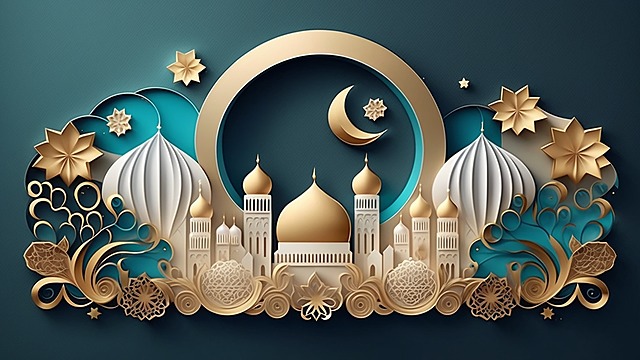10 Popular Muslim festivals are significant occasions in the Islamic calendar, marked by religious observances, community gatherings, prayers, feasts, and acts of charity. These festivals celebrate important events in the life of Prophet Muhammad, key moments in Islamic history, and the pillars of faith. Below is an overview of some of the most important Muslim festivals and celebrations, their significance, and how they are observed:
1. Eid al-Fitr (April 1, 2025) Muslim festivals
- Significance: Eid al-Fitr, also known as the Festival of Breaking the Fast, marks the end of the Islamic holy month of Ramadan, a month of fasting, prayer, and reflection. It is a celebration of the successful completion of fasting and devotion.
- Celebrations: On Eid al-Fitr, Muslims gather for special prayers at mosques or open grounds, followed by feasts with family and friends. Zakat al-Fitr, a charitable donation, is given before the prayer to assist those in need. Traditional dishes and sweets are shared, and people exchange gifts and greetings like “Eid Mubarak.”
2. Eid al-Adha (June 28, 2025) Muslim festivals
- Significance: Eid al-Adha, also known as the Festival of Sacrifice, honors the willingness of Prophet Ibrahim (Abraham) to sacrifice his son Isma’il (Ishmael) in obedience to God’s command. Before the sacrifice could take place, God provided a ram to sacrifice instead. This festival also marks the end of the annual pilgrimage to Mecca (Hajj).
- Celebrations: Muslims around the world slaughter an animal (usually a goat, sheep, or cow) as an act of sacrifice and share the meat with the poor, family, and friends. Special prayers are held in the morning, and the day is spent in worship, reflection, and community.
3. Lailat al-Miraj (February 27, 2025) Muslim festivals
- Significance: Lailat al-Miraj commemorates the Night Journey and Ascension of the Prophet Muhammad to the heavens. On this night, it is believed that the Prophet was taken to the Al-Aqsa Mosque in Jerusalem and then ascended to the heavens, where he met previous prophets and received the command for Muslims to pray five times a day.
- Celebrations: The night is marked by special prayers, recitations of the Quran, and gatherings at mosques. It is a night of devotion, remembrance, and seeking spiritual closeness to God.
4. Lailat al-Qadr (April 16, 2025) Muslim festivals
- Significance: Lailat al-Qadr, or the Night of Power, is believed to be the night when the Quran was revealed to Prophet Muhammad. It is one of the most sacred nights in Islam, particularly during the last ten days of Ramadan.
- Celebrations: Muslims believe that prayers offered on this night are especially powerful and that God’s mercy and forgiveness are abundant. It is a night for intense prayer, Quranic recitations, reflection, and seeking forgiveness for sins.
5. Mawlid al-Nabi (October 5, 2025) Muslim festivals
- Significance: Mawlid al-Nabi commemorates the birth of Prophet Muhammad. While this day is not universally celebrated across all Muslim communities, it is significant for many, especially in Sufi traditions.
- Celebrations: On this day, Muslims gather for prayers, readings of the Quran, and discussions on the life and teachings of the Prophet. In some cultures, special meals, processions, and displays of affection for the Prophet are held.
6. Ashura (October 6, 2025) Muslim festivals
- Significance: Ashura holds multiple meanings for different Muslim sects. For Shia Muslims, it is a day of mourning, commemorating the martyrdom of Imam Hussein (the grandson of Prophet Muhammad) in the Battle of Karbala. For Sunni Muslims, it is a day of fasting and reflection, believed to be the day when Moses and the Israelites were saved from Pharaoh’s tyranny.
- Celebrations: Shia Muslims observe this day with mourning rituals, including the recitation of eulogies and symbolic acts of grief. Sunni Muslims may fast on this day and engage in prayers of gratitude and reflection.
7. Hajj (August 28, 2025 – September 1, 2025) Muslim festivals
- Significance: Hajj is the annual pilgrimage to Mecca that every Muslim who is physically and financially able must perform at least once in their lifetime. It is one of the Five Pillars of Islam and a central act of worship for Muslims.
- Celebrations: Hajj takes place during the Islamic month of Dhul-Hijjah and includes several key rituals such as walking around the Kaaba, performing prayers at Arafat, and the symbolic act of stoning the devil. The pilgrimage is a deeply spiritual journey, symbolizing unity, equality, and submission to God.
8. Islamic New Year (Hijri New Year) (July 27, 2025)
- Significance: The Islamic New Year marks the beginning of a new year in the Hijri calendar, which is based on the lunar cycle. The first month of the Islamic year is Muharram.
- Celebrations: While the Islamic New Year is generally observed quietly with prayers and reflection, it is an opportunity for Muslims to mark the passage of time, reflect on their spiritual journey, and seek forgiveness and blessings from God.
9. Tashahhud (Eid Milad-un-Nabi) Muslim festivals
- Significance: Some Muslims commemorate the birth of the Prophet Muhammad on the 12th day of Rabi’ al-Awwal as Eid Milad-un-Nabi. It’s a day for honoring the life of the Prophet and his teachings.
- Celebrations: Prayers, sermons, and storytelling about the life of Prophet Muhammad take place. In some regions, processions, gatherings, and sharing food with family and community are common.
10. Fitr al-Sadiq (Charitable Giving) Muslim festivals
- Significance: This festival emphasizes the act of giving, particularly after the completion of the fasting month of Ramadan. Muslims are encouraged to engage in charitable acts, helping the poor and those in need.
- Celebrations: Muslims give Zakat al-Fitr, a form of charity, to ensure that everyone can partake in the celebrations of Eid.
11. Qurbani (Eid al-Adha) Muslim festivals
- Significance: Qurbani is the act of sacrificing an animal during Eid al-Adha in honor of Prophet Ibrahim’s devotion to God’s will. This tradition emphasizes the spirit of self-sacrifice, generosity, and helping those in need.
- Celebrations: The meat from the sacrificed animals is shared with family, friends, and the less fortunate.
Conclusion Muslim festivals
Muslim festivals are important occasions that reflect the values of devotion, faith, and community. They provide an opportunity for Muslims to come together, strengthen their relationship with God, and engage in acts of charity, reflection, and celebration. These festivals not only mark significant events in Islamic history but also serve as moments for personal spiritual growth and renewal.


Leave a Reply